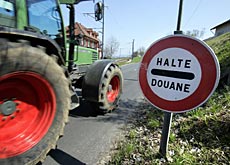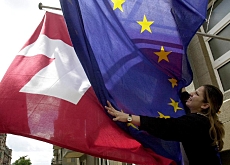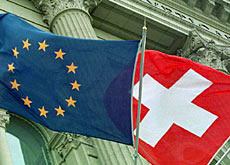Swiss left wondering about vote impact

What will be the consequences if Swiss voters reject a labour accord with the ten new European Union countries on September 25?
The indications are that the EU will be reluctant to accept a rejection of the treaty in the referendum called by rightwing parties.
In June the EU foreign affairs commissioner, Benita Ferrero-Waldner, caused an outcry when she intimated that Switzerland could not join the European passport-free zone unless Swiss voters approve the labour deal.
Supporters of the free movement agreement argue that Brussels wouldn’t tolerate discrimination by the Swiss against citizens of the ten new EU member states.
The accord is closely linked to a first set of bilateral treaties signed five years ago between Switzerland and the original 15 EU member states.
Consequently the EU could decide to cancel all seven accords making up the bilateral treaties. But Brussels could not do so immediately as all 25 EU members would have to approve such a decision.
Playing down risks
Opponents of the labour accord in Switzerland play down the impact of a possible “no” vote.
They quote Switzerland’s chief negotiator, Michael Ambühl, as saying he could not predict the EU’s likely reaction.
Ambühl is also quoted as saying that Austria is not likely to be very keen on taking over transalpine heavy goods road traffic from Switzerland.
As part of a bilateral transport agreement with the EU, Switzerland has allowed trucks of up to 40 tons to use Swiss roads.
Officially, neither Brussels nor the Swiss government have drawn up a scenario in the event of the labour accord being rejected at the polls.
The close economic links between Switzerland and the EU make it hard to predict what impact the suspension of the treaties – covering transport, labour, agriculture and research – would have.
Step back
The Swiss business community has said it is unthinkable to reintroduce trade barriers which were in place before the first set of bilateral accords came into force, namely a 28-ton weight limit for trucks and customs duties on agricultural products.
For their part, officials in Brussels have dismissed allegations that they would punish Switzerland if its voters failed to back the new labour accord.
But experts argue that Switzerland is unlikely to win more goodwill within the EU in the event of a “no” vote.
They say controversial statements by Ferrero-Waldner made after a referendum in Switzerland on closer security and asylum cooperation (the Schengen/Dublin accords), indicate possible problems and political complications ahead.
Supporters of the labour accord argue that problems in bilateral relations crop up regardless of controversial political decisions.
They highlight problems in science and research programmes, the implementation of an accord on cooperation in the film industry, as well as the issue of Swiss financial contributions to the enlarged EU.
Blow for export industry
Swissmem, the umbrella organisation representing the mechanical and electrical engineering industries, warns that a “no” vote on September 25 would have a negative impact.
It believes that Switzerland’s key export branch is unlikely to benefit as much from economic growth in eastern Europe if the labour accord is voted down.
Opponents take a different view. They argue that there is already unhindered access to the EU market because all trade accords have applied to the new EU member states since last May.
For them the ballot is essentially a poll on unhindered immigration for citizens from the ten new member states, which joined the EU last year.
More votes to come
The issue is not going away any time soon. Further votes are likely whenever a new country, such as Romania, Bulgaria or possibly Turkey, joins the EU.
Under the terms of a staggered introduction of the new labour accord negotiated with Brussels, the Swiss can decide at the ballot box in about 2011 whether or not they want to endorse the September 25 decision.
But for opponents, the real choice takes place at the ballot box next month.
“It is an illusion to believe that Switzerland could ever say ‘no’ after saying ‘yes’ on September 25.”
swissinfo with agencies
The three main political parties, the government, the business federation and most trade unions have come out in favour of the labour accord.
Opponents are made up of far-right and conservative groupings, led by the rightwing Swiss Peoples’ Party.
Some radical leftwing trade unions are also against the treaty.
The main arguments of the supporters:
Strengthening the Swiss economy
Boost for the labour market, improved working conditions
Favourable results from labour accord with the 15 EU member states
Political and economic stability
‘No’ vote would create uncertainty in relations with EU
Main arguments of opponents:
Risk of higher unemployment
Risk of salary dumping
Wave of immigrants
Strain on social security system
More bureaucracy and state intervention

In compliance with the JTI standards
More: SWI swissinfo.ch certified by the Journalism Trust Initiative


You can find an overview of ongoing debates with our journalists here. Please join us!
If you want to start a conversation about a topic raised in this article or want to report factual errors, email us at english@swissinfo.ch.